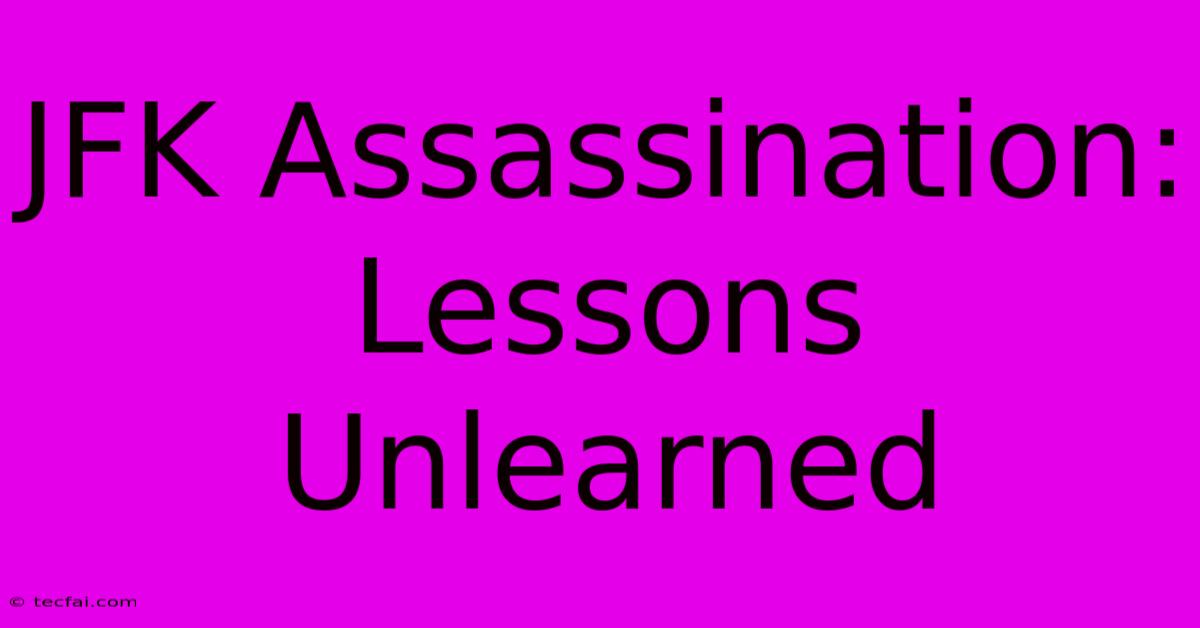JFK Assassination: Lessons Unlearned

Discover more detailed and exciting information on our website. Click the link below to start your adventure: Visit Best Website tecfai.com. Don't miss out!
Table of Contents
JFK Assassination: Lessons Unlearned
The assassination of President John F. Kennedy on November 22, 1963, remains one of the most pivotal and controversial events in American history. Beyond the immediate tragedy, the event offers a chilling case study in national vulnerability and the enduring consequences of unanswered questions. While the Warren Commission concluded Lee Harvey Oswald acted alone, persistent doubts and conflicting evidence continue to fuel debate, highlighting critical lessons that America seemingly hasn't fully learned.
The Peril of Unchecked Power and Secrecy
The assassination exposed the dangers of unchecked power within government agencies. The handling of the investigation itself, characterized by inconsistencies and a lack of transparency, fostered distrust in official narratives. The alleged involvement of various intelligence agencies, like the CIA and FBI, further fueled conspiracy theories and underscored the need for greater accountability and oversight. This lack of transparency, a recurring theme in subsequent national security crises, demonstrates a failure to learn from the immediate fallout of the Kennedy assassination. The public's demand for truth and transparency wasn't adequately met, leaving a legacy of skepticism that persists to this day.
Vulnerability to Domestic Extremism and Violence
The assassination served as a stark reminder of the vulnerability of even the most powerful nation to acts of domestic extremism and violence. While Oswald's motivations remain a subject of debate, his actions highlighted the need for robust security measures and a more comprehensive approach to identifying and addressing potential threats. The failure to adequately protect the President, combined with the subsequent chaos and confusion, revealed critical gaps in national security preparedness. Unfortunately, subsequent events, including the Oklahoma City bombing and other acts of domestic terrorism, demonstrated a persistent inability to fully address the threat.
The Enduring Power of Conspiracy Theories and Misinformation
The assassination fueled a persistent wave of conspiracy theories, fueled by conflicting evidence, inconsistent narratives, and a lack of complete transparency from official investigations. This underscores the enduring power of misinformation and the importance of fostering critical thinking and media literacy. The proliferation of conspiracy theories surrounding the assassination not only distracts from genuine historical analysis but also undermines trust in institutions and official narratives. The internet age has only exacerbated this problem, making it even more challenging to combat the spread of unsubstantiated claims. Understanding how misinformation spreads and how to effectively counter it remains a crucial lesson unlearned.
The Importance of Open Dialogue and Reconciliation
The persistent divisions and conflicting narratives surrounding the assassination highlight the need for open dialogue and a commitment to truth-seeking. Instead of fostering a national conversation about the event and its implications, the official response often served to deepen existing societal fissures. The failure to address the public's need for understanding and closure contributed to a legacy of mistrust and skepticism. This points to a broader failure to engage in constructive dialogue surrounding divisive events, hindering national unity and reconciliation.
Conclusion: A Legacy of Unfinished Business
The assassination of President Kennedy remains a potent symbol of national trauma and a stark reminder of lessons unlearned. The issues raised by the event – the dangers of unchecked power, vulnerabilities to extremism, the spread of misinformation, and the need for open dialogue – continue to resonate in contemporary society. Until we confront these issues head-on and learn from the mistakes of the past, the legacy of November 22, 1963, will continue to cast a long shadow over the American narrative. The pursuit of truth, transparency, and national unity remains an unfinished task, a testament to the enduring impact of this historical tragedy.

Thank you for visiting our website wich cover about JFK Assassination: Lessons Unlearned. We hope the information provided has been useful to you. Feel free to contact us if you have any questions or need further assistance. See you next time and dont miss to bookmark.
Featured Posts
-
Wickeds Successful Opening Night
Nov 23, 2024
-
Donald Trump And Pam Bondi Ag
Nov 23, 2024
-
Jones 160 M Giants Contract Cut
Nov 23, 2024
-
Kendrick Lamar Drops Surprise Album Gnx
Nov 23, 2024
-
Mama 2024 Rose At Bruno Mars Duet
Nov 23, 2024
